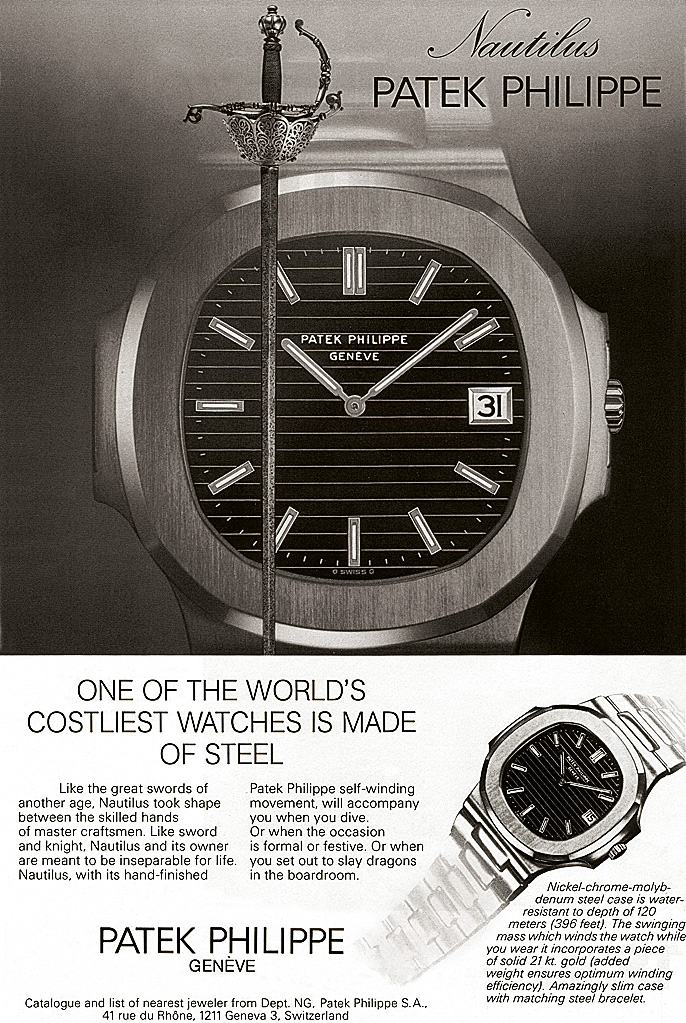Patek Philippe replica watches online introduced the Nautilus in 1976. Since then, it’s become one of the brand’s most sought-after watches. In this feature from the WatchTime archives, we trace the evolution of the Nautilus through its 40+-year history.
When Patek Philippe introduced the Nautilus in 1976, it wasn’t the first luxury sports watch in steel. That was claimed by Audemars Piguet’s Royal Oak in 1972. But the Nautilus was positioned at an even higher price point, and the ads for the first model, Reference 3700, played on this idea, showing the watch with the tagline, “One of the world’s costliest watches is made of steel.” The watch’s distinctive shape also drew attention. The bezel is neither round nor rectangular but is an octagon whose sides are curved outward. With a diameter of 42 mm, the Nautilus was ahead of its time in terms of size, and it was 3 mm larger than the Royal Oak.

Gérald Genta, who designed the Royal Oak for Audemars Piguet, brought his sketch for the Nautilus to Patek Philippe in 1974. The unusual case shape was inspired by a ship’s porthole, with a rounded octagonal bezel and “ears” on the case for a hinge on one side and a closure on the other. Embossed horizontal grooves on the dial and the integrated metal bracelet added to the watch’s character and made it easy to recognize. At this time, Patek Philippe collections were almost exclusively comprised of elegant gold watches with sophisticated complications like perpetual calendars and minute repeaters. Despite initial doubts that such a large and sporty timepiece would be an appropriate addition, best replica Patek Philippe introduced the watch under the name “Nautilus” two years later.
The Nautilus name comes from the submarine featured in Jules Verne’s classic novel 20,000 Leagues Under the Sea. The portholes on Captain Nemo’s submarine were often depicted as having an oval shape. The watch’s likeness to the porthole is not only visual. Like a porthole, the sides serve to attach the bezel to the case so there is only one opening, in addition to the crown. The movement and the dial are both taken out of the case from the front. This construction was necessary to achieve the watch’s water resistance of 120 meters, which, at the time, was especially high. The Nautilus name emphasizes this feature. In another ad, the Nautilus is shown being worn on two very different wrists, one in a diving suit and the other in formal evening wear.
The first aaa quality Patek Philippe Nautilus ref. 3700 fake watches with Swiss movements, was powered by the thin self-winding movement 28-255, which was developed in 1967 by Jaeger-LeCoultre for Vacheron Constantin, Patek Philippe and Audemars Piguet. It was first used in the Royal Oak and designated Caliber 2121.
Demand for the Nautilus was rather slow at first, but this changed dramatically in 1980 when Patek Philippe introduced a ladies’ Nautilus with a quartz movement, and one year later, when a mid-size men’s version (Reference 3800) debuted that measured only 37 mm in diameter. In 1996, a Nautilus model was offered that had Roman numerals and a smooth dial. Gold versions were added soon thereafter. Once the smaller versions of the Nautilus became available, collectors began referring to the original, larger Nautilus as “Jumbo.” Production of this model stopped in 1990. It continues to achieve top prices at auctions.
Patek Philippe introduced a Nautilus in its original 42-mm size, Reference 3710, in 1998, but this model had Roman numerals and a power-reserve indicator. In 2005, Reference 3712 was added to the Nautilus collection. It had power-reserve and moon-phase indicators, and a small pointer-date display arranged in an asymmetrical fashion. This model was updated after only one year.
In 2006, in celebration of the Nautilus’s 30th anniversary, Patek Philippe updated the collection with a rounder case shape and a modified case design. The case no longer consisted of a combined base and mid-section with a top, but now had a classical three-piece case structure. With modern manufacturing methods, the change did not affect the watch’s water resistance. And for every model, the “ears” attaching the bezel to the mid-section were rounded off, and the movement could be viewed through a transparent caseback. The bracelets were also refined and given a more modern look.
Reference 5711 was also introduced in 2006. It has a 43-mm-diameter case, surpassing the original Nautilus by 1 mm. (Measured without the crown, from 10 o’clock to 4 o’clock, it is 40 mm.) The classic three-hand watch in steel has a steel bracelet and a black-blue dial. The watch is powered by in-house Caliber 315 S C with a centrally mounted oscillating weight. It is a worthy successor to the original version and mirrors the look of that model, but with an added central sweep seconds hand. This model was a real hit and demand far exceeded supply. Like the Rolex Daytona, prices for this watch on the pre-owned market are about 50 percent higher than new – and this above the price of the current model of $29,800. (A pre-owned version with a white dial may be found at a lower price than the black/blue version.) The Nautilus cufflinks made by Patek Philippe show how strong the collection’s design is. They have the watch’s iconic shape, its two “ears,” and horizontal stripes in black/blue or other colors to match various models, under a sapphire crystal. These accessories can immediately be identified as part of the Nautilus watch family.
In the anniversary year 2006, the manufacture also debuted the best AAA copy Patek Philippe Nautilus Chronograph with the newly developed Caliber 28-520 C, Reference 5980, which is currently available only in rose gold and in two-tone steel and rose gold. This was the first Nautilus to contain the chronograph movement with no additional functions – if you assume that a rapid-advance date, combined minutes and hour counter, and flyback function for the direct resetting of the running chronograph are not “additional functions.”